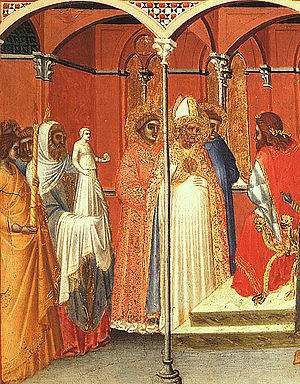Sabinus of Spoleto (died c. 303) was a bishop in the early Christian church who resisted the Diocletianic Persecution and was martyred.
Saint Sabinus | |
|---|---|
 Saint Sabinus before Venustian, preaching the gospel. Pietro Lorenzetti. | |
| Bishop and Martyr | |
| Born | 3rd century AD |
| Died | c. 303 AD Spoletium, Roman Umbria (modern-day Spoleto, Umbria, Italy) |
| Venerated in | Catholicism; Eastern Orthodoxy |
| Canonized | Pre-congregation |
| Feast | 30 December in both Catholic and Eastern Orthodox Churches[1] |
Traditional narrative
editAccording to legend, Venustian, governor of Etruria and Umbria, had Sabinus and his deacons arrested in Assisi. Diocletian's order required all Christians to sacrifice to the Roman gods or be put to death; their estates were then to be seized for the state.
Venustian mocked Sabinus's faith, accusing him of leading the people to the worship of a dead man. When Sabinus said that Christ rose on the third day, Venustian invited him to do the same thing. The deacons were in great fear, but Sabinus encouraged them to hold to their faith, and they died after being torn apart by iron hooks. Venustian had Sabinus's hands cut off.
In prison after the martyrdom of his deacons, he was tended by a woman named Serena. While in prison, he healed a man born blind. Venustian heard of the cure and sought a cure for his own eyes from Sabinus. Sabinus healed the governor and converted him to Christianity. Venustian then sheltered Sabinus. Maximianus Herculius, hearing of this, ordered the tribune Lucius to address the matter. Lucius had Venustian, his wife, and his two sons beheaded at Assisi, and he had Sabinus beaten to death at Spoleto.
Veneration
editSabinus's feast day is 30 December in the Eastern Orthodox Church and in the Roman Martyrology of the Catholic Church.[a][3][4]
He is depicted in the Maestà of Duccio.
The church of San Sabino, dedicated to the saint, is outside Spoleto.
Other saints of the name
editThe Roman Martyrology lists six saints called Sabinus, three of whom were bishops. The other two are Sabinus of Canosa (died c. 566; feast day, 9 February) and Sabinus of Piacenza (died late 4th century; feast day, 11 December).
Notes
edit- ^ Catholics may commemorate the saint on another day in some communities or locations, according to specific needs or customs of particular churches or national calendars of the Roman Rite.[2]
References
edit- ^ Hutchison-Hall, John (Ellsworth) (2012), "30th December – Sabinus, Exuperantius, Marcellus, Venustian and Companions", Orthodox Saints of the Pre-Schism See of Rome, Eastern Orthodox Christian theologian, historian, philosopher, and cultural commentator, retrieved 18 January 2023
- ^ Second Vatican Council, Decree on the Pastoral Office of Bishops in the Church Christus Dominus,11
- ^ Martyrologium Romanum (Editio typica ed.). Città del Vaticano: Typis Vaticanis. 2004. ISBN 88-209-7210-7.
- ^ See:
- "Saint Sabinus of Spoleto and Companions". Catholic Current. Washington, DC: United States Conference of Catholic Bishops. 2021. Retrieved 18 January 2023. United States Conference of Catholic Bishops
- "St. Sabinus - Saints & Angels". Catholic Online. Retrieved 18 January 2023.
Bibliography
edit- Englebert, Omer. "The Lives of the Saints." Anne and Christopher Fremantle, trans. Nihil obstat 1954. New York: Barnes & Noble, 1994, p. 494-495